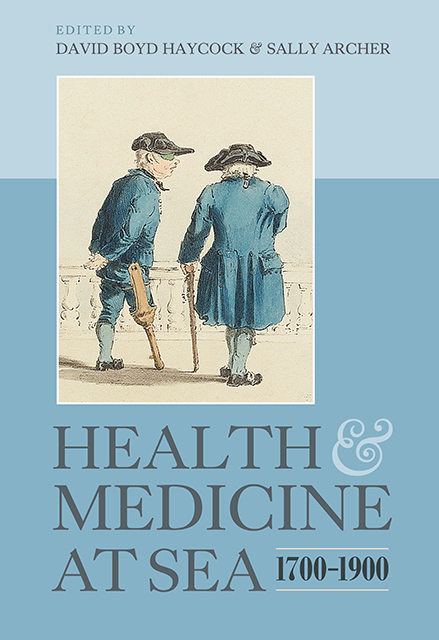Book contents
- Frontmatter
- Contents
- List of Figures and Tables
- Preface
- List of Contributors
- Acknowledgements
- List of Abbreviations
- Introduction Health, Medicine and the Maritime World: A History of Two Centuries
- 1 ‘The Intention is Certain Noble’: The Western Squadron, Medical Trials, and the Sick and Hurt Board during the Seven Years War (1756–63)
- 2 Royal Navy Surgeons, 1793–1815: A Collective Biography
- 3 Surgery in the Royal Navy during the Republican and Napoleonic Wars (1793–1815)
- 4 The Sick and Hurt Board: Fit for Purpose?
- 5 An ‘Important and Truly National Subject’: The West Africa Service and the Health of the Royal Navy in the Mid Nineteenth Century
- 6 Mortality and Migration: A Survey 128
- 7 Slave Purchasing Strategies and Shipboard Mortality: Day-to-Day Evidence from the Dutch African Trade, 1751–1797
- 8 Ships, Families and Surgeons: Migrant Voyages to Australia in the Age of Sail
- 9 Medical Encounters on the Kala Pani: Regulation and Resistance in the Passages of Indentured Indian Migrants, 1834–1900
- Bibliography
- Index
Introduction - Health, Medicine and the Maritime World: A History of Two Centuries
Published online by Cambridge University Press: 07 March 2023
- Frontmatter
- Contents
- List of Figures and Tables
- Preface
- List of Contributors
- Acknowledgements
- List of Abbreviations
- Introduction Health, Medicine and the Maritime World: A History of Two Centuries
- 1 ‘The Intention is Certain Noble’: The Western Squadron, Medical Trials, and the Sick and Hurt Board during the Seven Years War (1756–63)
- 2 Royal Navy Surgeons, 1793–1815: A Collective Biography
- 3 Surgery in the Royal Navy during the Republican and Napoleonic Wars (1793–1815)
- 4 The Sick and Hurt Board: Fit for Purpose?
- 5 An ‘Important and Truly National Subject’: The West Africa Service and the Health of the Royal Navy in the Mid Nineteenth Century
- 6 Mortality and Migration: A Survey 128
- 7 Slave Purchasing Strategies and Shipboard Mortality: Day-to-Day Evidence from the Dutch African Trade, 1751–1797
- 8 Ships, Families and Surgeons: Migrant Voyages to Australia in the Age of Sail
- 9 Medical Encounters on the Kala Pani: Regulation and Resistance in the Passages of Indentured Indian Migrants, 1834–1900
- Bibliography
- Index
Summary
The two centuries between 1700 and 1900 witnessed profound changes in Western medicine, and the period covered by this book (which principally focuses on the experience of Britain and its empire) can be chronologically bookmarked by two key moments: the foundation of Greenwich Hospital in 1694, and the foundation of the London School of Tropical Medicine in 1899. Yet despite the recognition of the need for greater palliative care which led to the establishment of a hospital for old and invalid seamen at Greenwich, in terms of medical history, the eighteenth century began with an air of uncertainty, disagreement, doubt and disappointment. The period ended, however, in great optimism.
To briefly review this process of change, by the beginning of the eighteenth century, chemists, empirics and other ‘irregular’ practitioners had been attacking the traditional, scholarly method of medical practice (founded on the ancient writings of Galen) for almost two centuries. Influenced by the writings and later followers of the sixteenth-century German physician Paracelsus, these laymen (and sometimes women) were highly critical of a medical system which they felt was dominated by university-educated physicians who had done little to improve the art of healing. But some of those very physicians were also dissatisfied with the results of the so-called ‘Scientific Revolution’ of the seventeenth century. While this had seen great advances in physics, optics, mathematics and astronomy, it had not resulted in any particular improvements in medical practice. In 1704 Dr Richard Mead, one of the wealthiest and most renowned of London's physicians, pondered why, ‘notwithstanding the considerable advances made in the study of nature by the moderns … this useful art [of medicine] has not received those benefits, which might reasonably be expected from a surer method of reasoning’. Indeed, he went so far as fretting that ‘medicine still deals so much in conjecture, that it hardly deserves the name of a science’. Sir Richard Blackmore, who like Mead was a Fellow of the Royal College of Physicians, reflected similarly two decades later:
It is wonderful, as well as much to be lamented, that this useful and important Art should be improved so little in so many Centuries, and that its State should still continue so uncertain and imperfect. We have hitherto discovered few Remedies of a peculiar specifical Virtue, for the Cure of any Diseases.
- Type
- Chapter
- Information
- Health and Medicine at Sea, 1700-1900 , pp. 1 - 18Publisher: Boydell & BrewerPrint publication year: 2009

